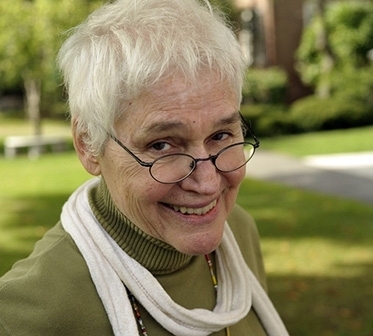Alison Knowles
Alison Knowles (b. 1933, New York, NY) is a visual artist whose work encompasses participatory installations, performance, sound, poetry, publications and tactile objects. Knowles studied briefly at Middlebury College and graduated with an honors degree in Fine Arts from Pratt Institute in 1956, where she was was awarded an honorary doctorate in 2015. A founding member of Fluxus, Knowles began using Cagean compositional devices, like indeterminate performance and chance operations in the early 1960s. For Something Else Press, Knowles collaborated with Marcel Duchamp on a screen reprint of his Coeurs Volants and designed and co-edited John Cage’s Notations (1968), a book of visual music scores. Knowles created one of the earliest book objects. Bean Rolls (1963), a can of text and beans, beginning her more than 30-year experimentation with the sculptural potential of the book. Among her Fluxus performance scores are Make a Salad (1962), Shoes of Choice (1963), The Identical Lunch (1969), and later sound installations, like Bean Garden (1971), enacted in galleries and on radio broadcasts. In 1967, Knowles’s The House of Dust, produced with James Tenney, was among the earliest first computerized poems, winning her a Guggenheim Fellowship in 1968. She brought this work to CalArts, where she taught from 1970-1972.
Recent solo exhibitions and performances include the Drawing Center in New York (2001), the Tate Long Weekend in London (2008), and the Solomon R. Guggenheim Museum, New York (2009). She was Artist-in-Residence at Radcliffe Institute for Advanced Study at Harvard University in Fall 2009. Knowles is the recipient of numerous grants and honors including a Guggenheim Grant (1967), NEA Grants (1981 and 1985), a DAAD fellowship (1984) a collaborative New York State Council on the Arts Grant (1989), a Dokumenta Professorship at the Kunstakademie Kassel, Germany (1998), the College Art Association Lifetime Achievement Award (2003), and Anonymous was a Woman Grant (2003). A retrospective exhibition of Knowles’s work is currently on view at the Carnegie Museum of Art until October 2016. Knowles lives and works in New York City.
